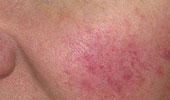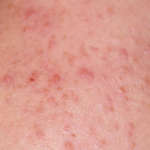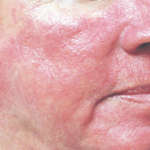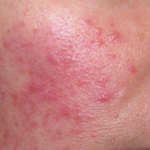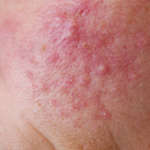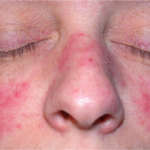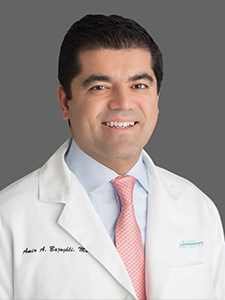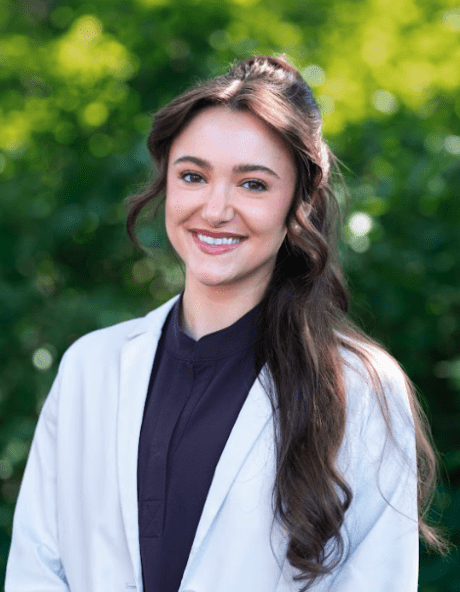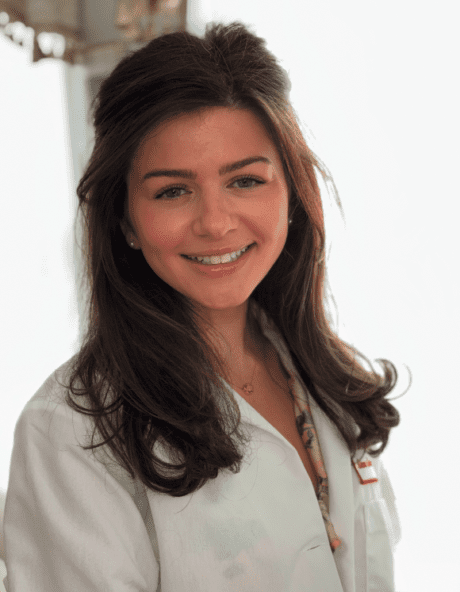Rosacea
Rosacea is a chronic (long-term) skin condition that usually results in facial flushing/redness and irritated skin. People with rosacea will often have flushed appearances and red and inflamed papules (bumps) similar to acne. The redness in the cheeks is due to the dilation of blood vessels and the pimples are due to inflammation of the skin. In most cases, rosacea often affects the face and has a predilection for the mid/central portion of the face and nose.
Rosacea is not dangerous but many people treat their rosacea in order to minimize the redness and to minimize the inflammatory papules on their face. Rosacea is a chronic condition with periods of exacerbation (breakouts) and remission. Hence, there is no definitive cure for rosacea but there are a number of medical and cosmetic treatments that your board-certified dermatologists and rosacea experts and specialists at Skin and Laser Dermatology Center will recommend for you. Call us today to learn how we can help you improve your skin and help treat your rosacea.
How is rosacea different from acne?
Acne and rosacea are two different skin conditions. Acne is caused by over-producing oil glands that cause inflammation. Rosacea is a long-term skin condition that causes flushing and redness in the center of the face, bumpy skin texture, and sensitive skin. Rosacea can differ from acne in the lack of comedones (whiteheads and blackheads), and how rosacea usually involves the mid-portion of the face whereas acne can involve the entire head/neck and chest/back areas.
How do I know if I have rosacea?
The best way to evaluate the type of skin condition you may have is to have a medical evaluation with one of our dermatologists and rosacea specialists. If you believe you may have rosacea, however, some of the most common symptoms are:
- You have what appears to be pimples, but they do not clear up.
- Anything you put on your face stings and burns.
- You blush or react severely to heat or being hot from physical activity. This may also happen after eating spicy foods, drinking alcohol or sun exposure.
- Your eyes usually feel itchy, dry and irritated.
- Your nose is bumpy and red or is getting enlarged (Rhinophyma).
Who is most likely to develop rosacea?
Rosacea can affect anyone but it is most common in women between the ages of 30 and 60 who have light skin. People who have family members with rosacea, have severe acne, or smoke are also more likely to develop rosacea.
What are the treatment options for rosacea?
As with many chronic skin conditions there is no known cure for rosacea at this time. However, there are many treatments that have been successful in controlling rosacea. Oftentimes a combination of treatments helps different aspects of this skin condition. There are oral (by mouth) and topical medications that work well for reducing the redness and inflammation, as well as laser treatments. The pulsed dye Laser (Vbeam Perfecta) is one the most effective treatments for reducing facial redness and the dilated blood vessels for rosacea.
Why is it important to treat my rosacea?
Controlling rosacea and reducing its appearance is important because if left untreated, the inflamed blood vessels can eventually remain enlarged. Those who suffer from rosacea will notice their breakouts may heighten and then decrease. However, if left untreated, permanent marks may result. Untreated, a patient’s face may have a permanent redness especially on the nose, cheeks, and chin. Make an appointment today and find out how our skilled and highly experienced dermatologists and rosacea specialists can help you get the treatment you need to help with your rosacea.
Photo Gallery
Frequently Asked Questions
Acne and rosacea are two different skin conditions. Acne is caused by over-producing oil glands that cause inflammation. Rosacea is a long-term skin condition that causes flushing and redness in the center of the face, bumpy skin texture, and sensitive skin. Rosacea can differ from acne in the lack of comedones (whiteheads and blackheads), and how rosacea usually involves the mid-portion of the face whereas acne can involve the entire head/neck and chest/back areas.
The best way to evaluate the type of skin condition you may have is to have a medical evaluation with one of our dermatologists and rosacea specialists. If you believe you may have rosacea, however, some of the most common symptoms are:
- You have what appears to be pimples, but they do not clear up.
- Anything you put on your face stings and burns.
- You blush or react severely to heat or being hot from physical activity. This may also happen after eating spicy foods, drinking alcohol or sun exposure.
- Your eyes usually feel itchy, dry and irritated.
- Your nose is bumpy and red or is getting enlarged (Rhinophyma).
Rosacea can affect anyone but it is most common in women between the ages of 30 and 60 who have light skin. People who have family members with rosacea, have severe acne, or smoke are also more likely to develop rosacea.
As with many chronic skin conditions there is no known cure for rosacea at this time. However, there are many treatments that have been successful in controlling rosacea. Oftentimes a combination of treatments helps different aspects of this skin condition. There are oral (by mouth) and topical medications that work well for reducing the redness and inflammation, as well as laser treatments. The pulsed dye Laser (Vbeam Perfecta) is one the most effective treatments for reducing facial redness and the dilated blood vessels for rosacea.
Controlling rosacea and reducing its appearance is important because if left untreated, the inflamed blood vessels can eventually remain enlarged. Those who suffer from rosacea will notice their breakouts may heighten and then decrease. However, if left untreated, permanent marks may result. Untreated, a patient’s face may have a permanent redness especially on the nose, cheeks, and chin. Make an appointment today and find out how our skilled and highly experienced dermatologists and rosacea specialists can help you get the treatment you need to help with your rosacea.
Our Providers
Dedicated Team
Skin & Laser Dermatology Center treats patients for all skin care concerns, including skin cancer surgery, cosmetic dermatology, sclerotherapy, laser peels, laser hair removal, hyperhidrosis, rosacea, and acne treatments.

